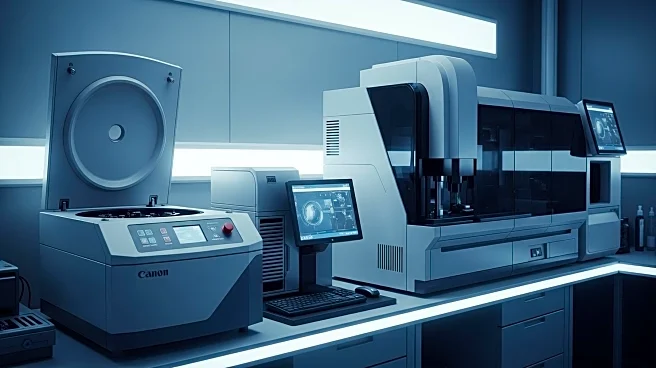What's Happening?
The plasmid purification market is experiencing significant growth, with projections indicating it will reach USD 5.88 billion by 2034, growing at a compound annual growth rate (CAGR) of 11.64% from 2024 to 2034. This growth is driven by the increasing demand for plasmids in genetics, biotechnology, and therapeutic development. Technological advancements, particularly in automation and AI, are enhancing the efficiency and scale of plasmid purification processes. North America currently dominates the market, holding a 41% share in 2024, while the Asia Pacific region is expected to be the fastest-growing area due to substantial investments in pharmaceutical and biotechnology sectors.
Why It's Important?
The expansion of the plasmid purification market is crucial for the advancement of gene therapy and biopharmaceuticals, which are increasingly important in treating genetic disorders and developing vaccines. The integration of AI and automation in purification processes not only accelerates production but also reduces costs, making these therapies more accessible. As demand for high-quality plasmid DNA grows, particularly for gene editing and transfection applications, the market's growth supports the broader biotechnology and pharmaceutical industries, potentially leading to breakthroughs in medical treatments and personalized medicine.
What's Next?
The market is expected to continue its growth trajectory, with the Asia Pacific region playing a significant role due to its investments in genetic medicine and bioprocessing technologies. Companies are likely to focus on enhancing purification methods and expanding their service offerings to meet the rising demand for gene therapy applications. The adoption of advanced technologies like multicolumn continuous chromatography will further improve yields and reduce contamination, supporting large-scale production. Stakeholders, including pharmaceutical companies and research institutions, will likely increase collaborations to leverage these technological advancements.
Beyond the Headlines
The ethical implications of gene therapy and genetic editing are significant, as these technologies have the potential to alter human genetics fundamentally. As the plasmid purification market grows, it may prompt discussions on regulatory frameworks and ethical guidelines to ensure responsible use of genetic technologies. Additionally, the market's expansion could lead to increased focus on intellectual property rights, particularly in regions like North America, where innovation in biopharmaceuticals is prevalent.









